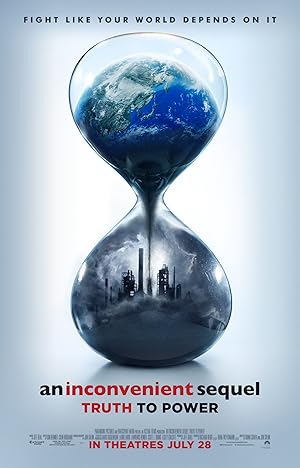
An Inconvenient Sequel: Truth to Power Page #7
has been very, very clear
that their concern is
not just the existence
of technology,
but their access
to that technology.
So... With what trust
do they let go
of the whole fossil fuel
development model
that has been paraded in front
of them for 150 years,
and now we're saying,
"Excuse me,
this parade, it's done."
"Now we have to build
It would be most helpful
if that focus on renewables
can be seen from the developing
- country's perspective.
- Yeah.
But is that something
that you could
devote some time to
while you're here?
Of course.
I'm trying to solve
an Indian problem,
first and foremost.
Their plan is to build 400
new dirty coal plants.
Uh, and that's a disaster.
When India goes to borrow money
or wind farms,
they have to pay 13%
plus an FX uncertainty.
And that is manifestly absurd.
Hey, Ben.
- Hey, Cory.
- Very good to see you.
Hey, Ed. How are you?
The challenge for us
is to find a way to make
renewables as cheap as coal,
and then partner with them
so that we don't build
this huge infrastructure
that will continue to provide
more carbon dioxide
decades in the future.
India has this plan,
200 gigawatts of coal.
I met with their energy
and power minister,
Piyush Goyal, in Delhi.
I asked,
what would it take to shift
another 100 gigawatts
from coal to renewables?
His answer was
incredibly specific.
Access to credit.
And, of course, with the
future of human civilization
in the balance,
we should probably
- ratchet that up a little bit.
- Wow.
More than 65%
of the world's carbon pollution
comes from the developing world.
Now, we're not pointing fingers.
This isn't a question of blame.
But we're here to change it.
The reason
that talks are stalled?
Because the U.S. government
put countries like India
as culprits,
as criminals, climate criminals.
And I don't think the U.S.
should be allowed
to get away with that.
Fabius has asked for
an urgent meeting, one on one.
They're getting frustrated
at the pace of the negotiations.
The long-term goal?
You spend a lot of time
each year in India.
So my narrow interest
is a way around
these high interest rates that
the Indians are
so concerned about
But we're not gonna
sort that out
in the next couple of days.
Yeah.
The overnight deluge
of some 300 millimeters of rain
in a span of 18 hours
has wreaked havoc.
The news is
that it's only gonna get worse
and the flood waters are rising.
India's fourth-largest city
was paralyzed
by the heaviest rains
in more than a hundred years,
which cut off more than
three million people
It's amazing that
while we're here
and India is a holdout,
they're having this.
Part of their thing
is that they need more money
to deal with it, right?
on that side in terms of
developed countries not
wanting to give that money.
- Yeah, yeah.
- Yes.
During the days that we are here
in this conference,
we have seen a repeat
of the pattern of more floods
and landslides.
Indeed today, in Chennai,
these events continue.
They have had
1,500 millimeters of rain
in the last several weeks alone.
Five feet of rain.
The number of people
who have been killed
is in the hundreds.
Tens of thousands
have been relocated.
This is not the first time
this has happened.
because of the climate crisis.
Prime Minister Modi went from
Paris back to Tamil Nadu
and said, "We are feeling
climate change's"
"fast-growing impact now."
No, no, it's all right.
I'm sorry to call you
on a Saturday evening.
So, the other sticking point
is, um, you know, credit
at a sufficiently
low interest rate
Uh, and...
But that's a separate issue.
So, here is the idea that I had.
Elon has a record
of giving up IP
on some of the core aspects
in Tesla.
You know, you take it
and do what you can with it.
I talked to President Hollande
about it also.
I didn't mention the company,
uh, but I mentioned
the general idea.
Hollande and Ban Ki-moon,
and I'm sure, at least
at the ministerial level,
with India,
we could have, uh, you know,
halo equity for SolarCity
that would be incredible.
But before I call
Lyndon or Elon,
I wanted to run it by you.
Yeah, would you, please?
And also send me Lyndon's
cell phone if you have it.
Lyndon?
Hi, it's Al Gore.
I have a big idea for you.
SolarCity could be
the corporate hero of Paris
by announcing that it will give
the technology
to the new world-champion
solar cell
to India.
Well, here's the logic
for it, Lyndon.
The big holdout here
in the negotiations is India.
Yeah, but that's up
to them, okay?
That's up to them.
I'm talking about
breaking the impasse
and getting them over the hump.
Give it some thought, my friend.
Bye.
So he swallowed hard and said,
"Ugh, I might have
We'll see.
It's crunch time
at the climate change
conference in Paris.
With a deadline
for a deal fast approaching,
it's clear that...
There's still some really tough
negotiations going on
among developed
and developing nations.
There is an argument
about who's responsible
for climate change,
who should pay
for the consequences.
What do you think
of the global warming summit
in Paris this week?
I think it's ridiculous.
We have bigger problems
right now.
To have the President be there
for an extended
period of time talking about
global warming
being the biggest problem
facing this country is insane.
He ought to get back to work
So, Mr. Minister,
to talk with you
and explain some of the details
on this extraordinary gift
being proposed by, uh,
the premier solar energy company
in the United States.
Give me the, uh, material.
"It's a hybrid polysilicon..."
And this is, uh...
It is a "silicon-based
bifacial PV cell"
"that combines
n-type substrates,"
"copper electrodes,"
"thin-film passivation layers"
"that yields
high conversion efficiencies."
And if, in return for this,
India remove its potential
objections to
the climate treaty,
then he said SolarCity
would be willing to do this.
Is there any precedent
for a technology
transfer to happen so quickly?
Well, you all know
about computer chips,
but let's take
a more mundane example.
Uh, cell phones.
Back around 1980,
I was in
the House of Representatives,
and I was so excited to buy
one of the very first
mobile phones.
Honestly, I felt that thing
was so cool.
And now there are
more mobile phones
than there are
people in the world.
Most of it in
developing countries
that had no landline
telephone grid.
And so they could leapfrog
and get telephone service
for the first time.
Well, guess what?
There are a lot of countries
Translation
Translate and read this script in other languages:
Select another language:
- - Select -
- 简体中文 (Chinese - Simplified)
- 繁體中文 (Chinese - Traditional)
- Español (Spanish)
- Esperanto (Esperanto)
- 日本語 (Japanese)
- Português (Portuguese)
- Deutsch (German)
- العربية (Arabic)
- Français (French)
- Русский (Russian)
- ಕನ್ನಡ (Kannada)
- 한국어 (Korean)
- עברית (Hebrew)
- Gaeilge (Irish)
- Українська (Ukrainian)
- اردو (Urdu)
- Magyar (Hungarian)
- मानक हिन्दी (Hindi)
- Indonesia (Indonesian)
- Italiano (Italian)
- தமிழ் (Tamil)
- Türkçe (Turkish)
- తెలుగు (Telugu)
- ภาษาไทย (Thai)
- Tiếng Việt (Vietnamese)
- Čeština (Czech)
- Polski (Polish)
- Bahasa Indonesia (Indonesian)
- Românește (Romanian)
- Nederlands (Dutch)
- Ελληνικά (Greek)
- Latinum (Latin)
- Svenska (Swedish)
- Dansk (Danish)
- Suomi (Finnish)
- فارسی (Persian)
- ייִדיש (Yiddish)
- հայերեն (Armenian)
- Norsk (Norwegian)
- English (English)
Citation
Use the citation below to add this screenplay to your bibliography:
Style:MLAChicagoAPA
"An Inconvenient Sequel: Truth to Power" Scripts.com. STANDS4 LLC, 2025. Web. 23 Feb. 2025. <https://www.scripts.com/script/an_inconvenient_sequel:_truth_to_power_2786>.







Discuss this script with the community:
Report Comment
We're doing our best to make sure our content is useful, accurate and safe.
If by any chance you spot an inappropriate comment while navigating through our website please use this form to let us know, and we'll take care of it shortly.
Attachment
You need to be logged in to favorite.
Log In